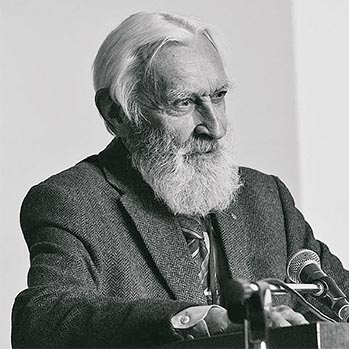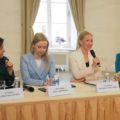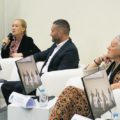On May 24–28, 2021 the First Kostomarovsky Forum was held in Moscow under the auspices of the Commission of the Russian Federation for UNESCO. The event was organized by the Pushkin State Russian Language Institute.
One of the aims of the Forum was to pay tribute to the founder and first Rector of the Institute, Vitaly Kostomarov (1930–2020). “Everything we have discussed is a continuation of his ideas and thoughts about the Russian language. He loved it wholeheartedly his entire life and managed to pass this feeling on to his numerous students all over the globe,” noted Margarita Rusetskaya, the current Rector of the Pushkin Institute.
Academician Kostomarov is the father of the methodological approaches to teaching Russian as a Foreign Language (RFL). His contribution to the state language policy of the USSR and Russia is enormous. Working out the RFL methodology was as important as developing virgin lands or launching an atomic bomb project. Many people were against teaching foreigners Russian in a different manner: why do that, when there is traditional grammar? But Kostomarov insisted that international students require a different approach, and he was right.
In 1966, Vitaly Kostomarov headed a newly established Scientific and Methodological Center of the Russian Language at Lomonosov Moscow State University. Its experts designed and implemented RFL teaching techniques and issued special textbooks.
In 1967, the International Association of Teachers of Russian Language and Literature was established in Paris. Its founders include Vitaly Kostomarov and three Western Slavists: Anatole Alitan, professor, director of the Heidelberg Institute for Translation (Germany); Paul Paillard, professor at the Lycée Voltaire (France), and Alfred Schmidt, professor of Slavic languages (Austria). In 1990, all three professors received Russian state awards. Today, the organization unites 69 countries.
In 1973, the Scientific and Methodological Center of the Russian Language was reorganized into an independent Pushkin Russian Language Institute, and in 1998 it became a state one. At present, the Institute offers training in a variety of fields. Its graduates are in demand in digitalization-related areas, and they are valuable members of Russian diplomatic missions and representations. In other words, the Pushkin Institute trains the international elite of Russian Studies.
What should a RFL professor be like today and tomorrow? This question was vividly discussed at the Kostomarovsky Forum. As Irina Orekhova, editor-in-chief of the Russian Language Abroad magazine highlighted, “When we teach a language, we teach culture. Russian culture is so exceptional, rich, and unique that it is per se a source of motivation to study. It is vital for RFL teachers to have a good command of geography, history, political science, and literature. They also have to be able to act as conductors, organizers, consultants, and guides.” Besides, a RFL professor needs to be in tune with the times. For instance, one can find Pushkin Institute professors and their students with guitars practicing Russian rock songs on Chistoprudny Boulevard, having classes in the Moscow Metro, and taking part in specially designed quests in the Tretyakov Gallery.
However, today it is not enough. The modern teacher often works in a hybrid format, with some of the students studying online. Hence, it is necessary to have a basic knowledge of pedagogical design and be able to create illustrative materials for mobile apps, telegram channels, and online courses. The Pushkin Institute had launched a professional development program for conducting online RFL lessons before the whole world switched to distance learning. The demand for the course exceeded all expectations, and a full cycle of programs was created. The Russianists learn to achieve learning objectives using infographics, longreads, games, comics, and videos, create online courses, choose control tools and learning platforms. A number of debates at the Kostomarovsky Forum were centered on technologies in the realm of education.
Some of the panels addressed the issue of the Russian language in the world. Many were concerned about its future in the CIS, the likelihood of English replacing it as the language of science, and its place in the post-information revolution era. The Pushkin Institute presented its new project, the Index of the Position of the Russian Language in the World. Margarita Rusetskaya, Rector of the Institute, explains, “It is a complex study aimed at determining the position of Russian as compared to other major languages as well as in different states. The research is based on statistical databases, including, for example, the World Census, international databases of scientific publications, and many other sources. The findings can be used to assess the effectiveness of the government programs to promote the Russian language. “
The Forum succeeded in providing a platform for a dialogue between society and the state. In particular, the first public discussion of conceptual approaches to the 2021–2030 State Program “Support and Promotion of the Russian Language Abroad” by the Ministry of Foreign Affairs of Russia took place as part of the event. The key outcome of the Forum is achieving a truly nationwide debate on the challenges and opportunities for the development of the Russian language. Organizers have already opened registration for the next year’s event, and 1355 applications have already been submitted as of June 1.
See you at the Second Kostomarovsky Forum in 2022!
Department of Project Management, Pushkin State Russian Language Institute
www.kostomarovforum.ru

Костомаров Виталий Григорьевич
Родился 3 января 1930 года в Москве. В 1952 году окончил филологический факультет Московского государственного университета, в 1953 году — переводческий факультет Московского государственного педагогического института иностранных языков им. М.Тореза. В 1955 году защитил кандидатскую диссертацию, в 1969 году получил степень доктора филологических наук. Профессор, член Российской академии образования. Работал переводчиком, преподавателем и руководителем кафедры русского языка в Высшей партийной школе, был заведующим сектором культуры и речи в Институте русского языка Академии наук СССР. До 2001 года возглавлял Институт русского языка им. А.С.Пушкина. В период с 1967 по 2003 год — генеральный секретарь, президент и вице-президент Международной ассоциации преподавателей русского языка и литературы (МАПРЯЛ). Являлся главным редактором журнала «Русская речь», членом редакционной коллегии журнала «Русский язык за рубежом». Автор и соавтор более 600 публикаций и научных работ, имеет государственные ордена и награды.



